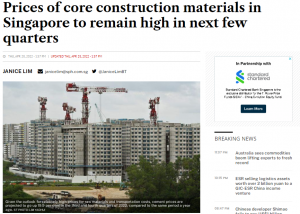Building Costs Are Rising – What You Need To Know
With the disruptions in supply chain, building costs have escalated over the last 2 years.
If you own or operate a business premises in Singapore, you will need to have a property insurance policy to cover your buildings and other assets.
Are your sum insured are up-to-date and sufficient to protect your business in the event of a loss?
We strongly recommend that you take time and seek professional advice to ensure that you are still adequately protected. It is important to get proper estimates of your building reinstatement costs which takes into account current and future inflation.
Purchasing insurance cover is a good first step, but is it enough?
If your buildings are underinsured, or if your policy contains what is known as an “Average Clause”, you may suffer a significant shortfall in the event of a loss.
RISING BUILDING COSTS – Does it matter?
The Business Times (April 28, 2022) reported that supply chain disruptions “will cause prices of labour, core materials in Singapore, such as copper, steel, concrete and bricks, to remain elevated in the next few quarters”.

It is important that business and commercial property owners, conduct a review of their building and plant & machinery sums insured, whether it’s a standalone asset or a portfolio. Where appropriate, they should also engage a professional valuation surveyor to undertake a Building Reinstatement Cost Assessment.
WITH THE INCREASE IN BUILDING COSTS, IS YOUR INSURANCE COVER STILL ADEQUATE?
WHAT IS UNDERINSURANCE?
It arises when you do not have sufficient insurance cover to protect your needs in the event of a claim. In such circumstances, when adjusting your claim, Insurers will apply what is known as the “Average Clause”. This is a process by which any claims settlement will reduce by the percentage of underinsurance. This can have serious implications for Insureds fully recovering their losses.
HOW IS THE “AVERAGE CLAUSE” APPLIED IN A CLAIM?
For example:
- If you insure your building for S$2.5m but the actual cost of reinstatement/rebuilding is S$5m
- You will be underinsured by 50%
- In a total loss, the maximum you will receive from Insurers is S$2.5m
- Similarly, a shortfall of 50% will also arise in the event of a partial loss [the implication is if there is a partial loss of say S$1.5m; you will receive only S$750,000]
Even if your policy is on a reinstatement basis (without an “Average Clause”), there will still be a condition stipulating that the sum insured under the policy must represent the correct rebuilding/reinstatement value as at the inception of the policy.
Another cautionary note:
Some insurance companies may refuse to pay any part of a claim if they believe a policyholder knowingly underinsured to save on premium costs.
HAVING A CORRECT REINSTATEMENT VALUATION IS AN IMPORTANT STEP
Avoid the stress and financial impact from underinsurance. Take the correct steps to ensure that the sums insured for your buildings and other assets remain sufficient.
Business owners are often unsure how they should arrive at a correct sum insured. As a result, many choose either the purchase price paid or their best estimate of its current market value.
Both approaches may be fine for accounting purposes but could have serious consequences in the event of an insurance claim.
For full protection, you should insure your buildings and other assets for the full cost of rebuilding/reinstatement on the same site in the event of a total loss. The cost should include items such as debris removal, architects/surveyors fees, outbuildings and other outside areas. You should also include GST if you are unable to claim it back.
Think a number of years ahead also on the basis that a loss may not happen until close to your next renewal date and it may take 1, 2 or even 3 years to rebuild.
PROTECT YOUR BUSINESS – REVIEW YOUR CURRENT INSURANCE PROGRAM
We recommend that you review your sums insured on buildings and other assets every year and consider an independent professional valuation every 3 years. This will help ensure that that you are not over-or under-insuring your property.
While the purpose of this blog post is mainly about building valuations, you should also review plant/machinery, general contents, and stock on an annual basis. This is especially important in light of the rising cost in raw materials, transport etc and the significant interruption in the supply chains for many products.
You should also consider if your Business Interruption Insurance sums insured remain adequate.
Speak to us now for timely and specialist advice.
If you have any questions about your current policy or insurance program, please contact us at acorn.contact@acornint.com.
